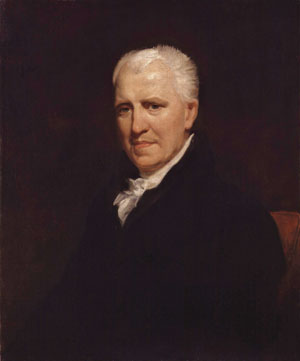Belvoir Castle
George Crabbe
When native Britons British lands possessed,
Their glory, freedom, and their blessing rest,
A powerful chief this lofty seat surveyed,
And here his mansion's strong foundation laid:
In his own ground the massy stone he sought.
From his own woods the rugged timbers brought;
Rudeness and greatness in his work combined,—
An humble taste with an aspiring mind.
His herds the vale, his flocks the hills, o'erspread;
Warriors and vassals at his table fed;
Sons, kindred, servants, waited on his will,
And hailed his mansion on the mighty hill.
In a new age a Saxon lord appeared,
And on the lofty base his dwelling reared:
Then first the grand but threatening form was known,
And to the subject vale a castle shown.
Where strength alone appeared,—the gloomy wall
Enclosed the dark recess, the frowning hall;
In chilling rooms the sullen fagot gleamed;
On the rude board the common banquet steamed;
Astonished peasants feared the dreadful skill
That placed such wonders on their favourite hill:
The soldier praised it as he marched around,
And the dark building o'er the valley frowned.
A Norman baron, in succeeding times,
Here, while the minstrel sang heroic rhymes,
In feudal pomp appeared. It was his praise
A loftier dome with happier skill to raise;
His halls, still gloomy, yet with grandeur rose;
Here friends were feasted, here confined were foes.
In distant chambers, with her female train.
Dwelt the fair partner of his awful reign:
Curbed by no laws, his vassal tribe he swayed,—
The lord commanded and the slave obeyed:
No softening arts in those fierce times were found,
But rival barons spread their terrors round;
Each, in the fortress of his power secure.
Of foes was fearless and of soldiers sure;
And here the chieftain, for his prowess praised,
Long held the castle that his might had raised.
Came gentler times;—the barons ceased to strive
With kingly power, yet felt their pomp survive;
Impelled by softening arts, by honour charmed,
Fair ladies studied and brave heroes armed.
The Lord of Belvoir then his castle viewed,
Strong without form, and dignified but rude;
The dark long passage, and the chambers small,
Recess and secret hold, he banished all,
Took the rude gloom and terror from the place,
And bade it shine with majesty and grace.
Then arras first o'er rugged walls appeared,
Bright lamps at eve the vast apartment cheered;
In each superior room were polished floors,
Tall ponderous beds, and vast cathedral doors:
All was improved within, and then below
Fruits of the hardier climes were taught to grow;
The silver flagon on the table stood,
And to the vassal left the horn and wood.
Dressed in his liveries, of his honours vain,
Came at the baron's call a menial train;
Proud of their arms, his strength and their delight;
Loud in the feast and fearless in the fight.
Belvoir Castle (pronounced "Beaver") sits on high ground and there has indeed been a castle there for at least 1000 years. The current building is the fourth on the site since the Norman Conquest. The house has been the home of the Manners family (Dukes of Rutland) for five hundred years.
